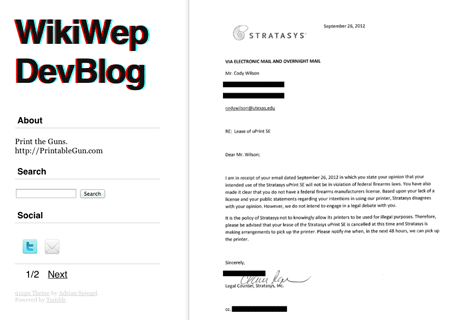As has been pointed out elsewhere across the world of internet chatter, Defense Distributed – a group of pro-gun lobbyists with the idea to 3D print a live firearm so everyone can have a gun – has had its 3D printer seized by its manufacturer Stratasys.
Comments on the Wiki Weapons story so far have condemned the idea, with thoughts along the lines of ‘well done Statasys’, and ‘what muppets want to bring more guns into this world?’.
We waited until the nice folks of Stratasys got back to us with their official line on the entire episode, which is:
“Stratasys reserves the right to reject an order. Members of Defense Distributed, like any U.S. citizens, are able to follow the well-established federal and state regulations to manufacture, distribute or procure a firearm in this country.”
All well and good – a responsible company stepping in and doing the safe, legal and proper deed.
However, it’s not simply a ‘Hillbilly’ Second Amendment thing. A colleague visiting a school in South London to show students 3D printing asked them what they could imagine printing for themselves. A student replied: “knives”.
I’m sure some students are intrigued by the intimacies of cutlery design, or it was simply the usual schoolboy interest in weapons that falls into the same bracket as fast cars and big chests; yet there’s always going to be a worry behind anyone having the ability to download a file, send it to print and having the resulting weapon ready to fire.
Before eveyone jumps up and screams that it isn’t that simple – I know this – but the technology is moving on in leaps and bounds. Simple ‘press to print products’ are what every company is aspiring to with their input into the home 3D printing market.
Already a number of online articles are looking for ways to combat the Wiki Weapons idea, yet there seems to be no clear answer. The main thought seems to be restricting the 3D CAD files of weapons from appearing online, although this merely leads to the usual line of how impossible it is to police the internet.
For the time being the limitations of the majority of 3D printers, such as the materials and processes, mean we’re a long way from an easily accessible 3D-printed threat to humanity, but we’d be interested to hear how you think this should be handled?







